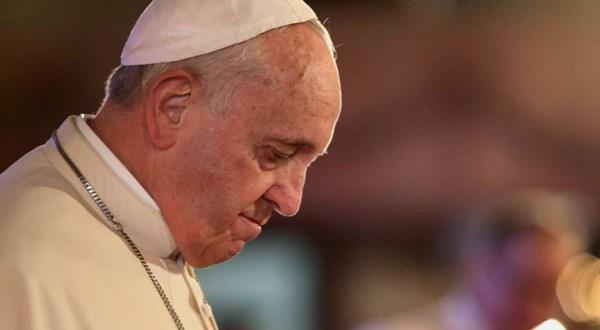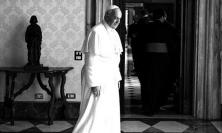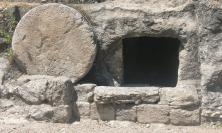Last month, Pope Francis wrote to the bishops of Chile to say sorry for his initial response to the clerical abuse crisis in the country. The pope’s apology and his insistence on the need for renewal in the Church are informed by texts that he has been drawing on for thirty years, says Austen Ivereigh. Writing in 1987, Jorge Mario Bergoglio described letters written by Jesuits during the Society’s suppression as ‘a marvel of criteria of discernment’ – how have these criteria been applied in the pope’s recent words and actions?
An obscure five-page prologue from Pope Francis’ past, published this month by the Jesuit journal La Civiltà Cattolica, reveals something of the ‘spiritual strategy’ he is currently pursuing with Chile’s troubled Church, as well as sharing vital discernment wisdom culled from the dark days of the suppression of the Society of Jesus that could be helpful for modern-day Catholics beleaguered by social change.
Francis first drew attention to his text – a 2,000-word preface to Las Cartas de la Tribulación, an Argentine translation into Spanish of eight letters by Jesuit superiors general from the late eighteenth and early nineteenth centuries – when he quoted from it in a powerful address in Santiago’s cathedral on 16 January. That speech to priests and religious on the second day of his Chile visit, charted a roadmap out of the desolation of persecution and failure, through the example of St Peter’s betrayal being forgiven by the risen Christ.
Describing the apostles’ dismay and confusion at Jesus’s crucifixion, when their world fell apart, Francis – quoting his prologue – noted how, at such times, ‘when the tempest of persecutions, tribulations, doubts, and so forth, is raised by cultural and historical events, it is not easy to find the path to follow. Those times have their own temptations: the temptation to debate ideas, to avoid the matter at hand, to be too concerned with our enemies… And I believe that the worst temptation of all is to keep dwelling on our own discouragement’.
Shortly afterwards, when he was with the Jesuits in Peru, he mentioned the book again, referring to ‘letters written in a time of tribulation’ by the two Jesuit superiors general, which he described as ‘a marvel of criteria of discernment, of criteria of action to not allow ourselves to be dragged down by institutional desolation’.
In its new edition La Civiltà Cattolica publishes the prologue, together with a note by the journal’s editor, Fr Antonio Spadaro SJ, which describes the book and the circumstances of its publication. Seven of the letters are by Father General Lorenzo Ricci, penned between his election in 1758 and 1773, when the Society of Jesus was suppressed by Pope Clement XIV. The eighth is by Father General Juan Roothan, elected in 1829, whose letter is from 1831.
According to Spadaro, Jorge Mario Bergoglio – who had been Jesuit provincial and later rector of the Colegio Máximo in Buenos Aires – arranged for the letters to be translated from their original Latin after returning from a year’s doctoral studies in Germany in 1986. He was at the time preparing for a meeting in Rome of delegates from each Jesuit province, at which he was the elected representative from Argentina, and believed that the letters spoke in a particular way to the Society of Jesus at the time.
Bergoglio notes in the prologue how the Ricci-Roothan letters are in effect a ‘doctrine of tribulation, and how it can be overcome’. The generals’ role at the time was to help the Jesuit body embrace an attitude of discernment at a time of phenomenal stress, keeping it open to God’s grace and preventing it being torn from its spiritual roots. In this way he sought to allow for the conversion opportunity that such trials bring – an opportunity threatened by a series of temptations or false consolations.
Among these threats, the generals identify a turning inwards, a ‘ruminating’ on desolation, as well as an exaggerated sense of persecution, and an urge to focus on abstract ideas. This last point in particular attracts Bergoglio’s attention. He describes how, in spite of the ideological nature of the attacks, the superiors general are concerned not with responding to the ideas involved but on the spiritual confusion that the attacks provoked. ‘Ideas are discussed, situations are discerned’, Bergoglio notes in a brief sentence that is emphasised with italics.
Francis sees the need for these same criteria at this time in the Church’s life, according to Spadaro, ‘because the Church is facing times of desolation and turbulence, of specious, anti-Gospel polemics.’ The discernment criteria have notably informed his response to the crisis in Chile, where church leaders have been accused of denial and cover-up in the wake of the Fr Fernando Karadima abuse scandal since it exploded in 2010-11.
The crisis has ensnared Francis himself. In 2015, the pope named a bishop accused of covering up for Karadima to the diocese of Osorno, steadfastly defending Juan Barros against criticism both by fellow bishops and three outspoken Karadima victims who have been campaigning for change in the Church’s response to victims. On his Chile visit, Francis described their accusations as calumnies and on the plane home told journalists that no proof had been offered of Barros’s cover-up.
But two weeks after returning from Chile, Francis sent the Vatican’s former chief prosecutor, Maltese archbishop Charles Scicluna, to hear not just from Karadima’s victims but to investigate the accusations against dozens of other clergy and religious there, many of which have been covered up or denied. (The respected U.S. website www.bishop-accountability.org lists almost 80 clergy in Chile publicly accused of sexually abusing minors since 2000.)
After reading Scicluna’s report, Pope Francis sent a letter to Chile’s bishops, in which he issued a heartfelt apology for his misjudgments, and initiated a discernment process involving a week-long visit by the three victims, to be followed on 14-17 May by a summons to the entire Chilean episcopate, to Rome.
That 8 April Chilean missive is the pope’s own ‘tribulation letter’ according to Fr Diego Fares, an Argentine Jesuit close to Francis who has written an article in the same issue of Civiltà that offers a contextual, in-depth treatment of the Bergoglio prologue. Fares sees the prologue as the second of a trio of articles Bergoglio wrote in those years that dealt with how the Church can resist and overcome attacks by the ‘bad spirit’ without being drawn into its mimetic contagion – in other words, how to stand up to the devil without being ensnared by him.
The first, ‘La acusación de sí mismo’, or ‘Self-accusation’, is about how that ancient spiritual practice can break patterns of mutual recrimination and scapegoating. The final one, ‘Silencio y Palabra’, is about enduring the bad spirit of ‘ferocious attacks’ – encarnizamiento in Spanish, accanimento in Italian – in silence and withdrawal.
The picture of an institution in desolation presented in ‘Self-accusation’ is strikingly similar to the Chilean situation. Experiencing intense criticism and a loss of confidence in public opinion, the Church there has shown signs of surrendering to ‘the temptation to shut ourselves away and isolating ourselves to defend our proposals that end up being little more than good monologues’, as Francis warned in January. He spoke at the time of his concern at Catholic organisations clinging to influence and power rather than ‘rolling up their sleeves and going out to touch the suffering reality of our faithful people’ – an ecclesial introversion and defensiveness that are the institutional symptoms of failing to meet the challenge of desolation. Other symptoms are mutual recrimination (bishops blaming each other), an exaggerated sense of victimhood, a circling of the wagons – in this case, against the Karadima victims – as well as scapegoating, in this case by both Church and media of Bishop Barros. It is easy to deduce, from ‘Self-accusation’, that such symptoms indicate that the bad spirit has taken over.
The way to break its hold is through what the desert fathers called ‘self-accusation’ – a confessing to the community of our sins and failures, and looking to God’s mercy. Hence, as Bergoglio observes in the ‘Tribulation’ prologue, the superiors general responded to the persecution by a surprising emphasis on the failings of the Jesuits. That way, he observed, they kept their focus on a spiritual attack affecting all – and to which all were vulnerable – rather than allowing it to be projected onto the enemy ‘other’.
This reading suggests that Pope Francis was doing much more than simply acknowledging his errors when he made his humble apology in the 8 April letter to Chile’s bishops. In defending Bishop Barros from scapegoating, he had ended up taking the side of the institution against the victims, becoming trapped in the same cycle of finger-pointing and blame that was afflicting the Chilean Church. As pope, his task was to assist the Church to overcome its tribulation by helping it to be converted by God’s grace. By accusing himself of serious errors of perception and judgement, and asking forgiveness of those he had hurt, he was breaking open the space for God’s grace to heal and restore.
‘I was part of the problem! I caused this. I am very sorry, and I ask your forgiveness,’ Pope Francis told Karadima’s victims – Juan Carlos Cruz, James Hamilton and Andrés Murillo – when he met them in two-hour personal encounters during their recent stay with him in the Vatican.
Accusing yourself before others, confident of God’s mercy, is very different from blaming others to exculpate yourself. It breaks the mimetic cycle by revealing the bad spirit, rather than concealing the bad spirit by perpetuating the mimetic cycle. In confessing so humbly and so boldly, and in inviting the stone that the builders rejected – Cruz, Hamilton and Murillo – to become the cornerstone of the Church’s renewal, Francis was firmly ‘acting against’ the temptations brought by desolation.
Hence, too, his insistence on the Church facing realities and not being tempted by ideological or ethical responses. Like Peter focusing on the stormy seas rather than on Christ when he stepped off the boat at Jesus’s invitation in Matthew 14, the temptation in times of tribulation is to be distracted by the attacks themselves, which brings the risk of defending the truth at the expense of love, or being loving at the expense of truth. In ‘Self-accusation’, Bergoglio observes that ideology claims to be the expression of an idea, of truth, whereas in reality it is the product of the will, and therefore needs to be engaged at a spiritual level, through discernment.
To engage a bad-spirit attack on the intellectual realm, in other words, is to collude in a deceit, for the truth is not an idea but a person, Jesus Christ, who is also charity, or love. An intellectual self-defence risks taking the focus from Christ, and so of presenting the truth in a way that is unloving, or in a loving way while betraying the truth. (This, of course, is the trap that the western Church has fallen into in its response to secularisation, in both its liberal and conservative responses).
The way for the Church to free itself from that trap is to look to Christ and His mercy, as Francis described the conversion of Peter in his address in Santiago, towards the end of which he again quotes from his 1987 prologue:
After they ate, Jesus takes Peter aside and his only words are a question, a question about love: Do you love me? Jesus neither reproaches nor condemns. The only thing that he wants to do is to save Peter. He wants to save him from the danger of remaining closed in on his sin, constantly dwelling with remorse on his frailty; he wants to save him from the danger of renouncing, because of that frailty, on all the goodness he had known with Jesus. Jesus wants to save him from self-centredness and isolation. He wants to save him from the destructive attitude of becoming a victim or of thinking ‘what does it matter?’, which waters down any commitment and ends up in the worst sort of relativism. Jesus wants to set him free from seeing his opponents as enemies and being upset by opposition and criticism. He wants to free him from being downcast and, above all, negative. By his question, Jesus asks Peter to listen to his heart and to learn how to discern. Since ‘it was not God’s way to defend the truth at the cost of charity, or charity at the cost of truth, or to smooth things away at the cost of both. Peter has to discern. Jesus wants to avoid turning Peter into someone who hurts others by telling the truth, or is kind to others by telling lies, or simply someone paralyzed by his own uncertainty’, as can happen to us in these situations.
Seeing the same temptations in the Chilean Church’s response to its desolation, Francis warned in his 8 April letter of fearfully retreating into ‘comfortable winter palaces’ and the danger of verbiage and abstraction. A refocusing on God’s mercy must begin by squarely facing up to the realities of sin and failure, and following Jesus’s example by washing the feet of others – serving, not dominating. By facing its wounds, allowing itself to receive God’s mercy, and then going out to serve those who are also wounded, the Church becomes the sign of a ‘transfigured’ community.
The 2,300-page report that Archbishop Charles Scicluna handed to Francis was a powerful means of helping the Church face its failure. It offered, the pope told Chile’s bishops, an unvarnished account of ‘the pain of so many victims of grave abuses of conscience and power, and in particular, of acts of sexual abuse of minors committed by many different religious in your country’. His choice of words was deliberately mortifying.
But then he called the bishops to join him in a period of discernment followed by concrete actions to restore the unity of the Church and to repair the scandals. Discernment is an action in response that is neither defensive nor passive; it is active, but at an appropriate (spiritual) level, and therefore transformative.
That transformation is already visible. Since receiving the pope’s self-accusation and being invited to help design necessary reforms, Cruz, Hamilton and Murillo are for the first time in a decade speaking of their hope in the Church. ‘In these days we have met a friendly face of the Church that is totally different from what we have known before,’ Cruz told journalists in Rome.
It is also having its effect on Chilean church leaders. The bishops’ conference president, the military bishop, Santiago Silva, recently offered a ‘self-accusation’ of his own, saying, in effect, that the crisis went much deeper than failure over abuse and showed a crisis in Chile’s way of being Church. He even quoted one of the victims, James Hamilton, that ‘now, more than ever, we need interior tranquility’.
This transition is what the Latin-American Church calls ‘pastoral conversion’. It is a journey from institutional introspection focused on an ethical or intellectual response to secularisation – which only exacerbates the cycle of deChristianisation – to a Christ-centred focus, in which the receiving and giving of God’s mercy re-centres the Church on the concrete needs of those who are suffering and deprived.
Just as in a person’s conversion through God’s mercy, in this pastoral conversion the Church’s sinful failures – its betrayal of the Gospel, its neglect or abuse of the vulnerable, its obsession with power and privilege – are what, paradoxically, become the source of its redemption. The knowledge of its wounds frees the Church from self-focus and the illusion of superiority.
As Francis put it in Chile: ‘A Church with wounds can understand the wounds of today’s world and make them her own, suffering with them, accompanying them and seeking to heal them. A wounded Church does not make herself the centre of things, does not believe that she is perfect, but puts at the centre the one who can heal those wounds, whose name is Jesus Christ.’
Peter’s journey in this way becomes the Church’s journey. ‘To know both Peter disheartened and Peter transfigured,’ as he put it in Santiago, ‘is an invitation to pass from being a Church of the unhappy and disheartened to a Church that serves all those people who are unhappy and disheartened in our midst.’
It is that transition to which not just the Chilean Church but the entire Church in the western world is being called, in a time of its own institutional failure as well as a frequently hostile culture. The Jesuits’ own great tribulation teaches us, via Pope Francis, to be aware of the temptation of defensive introspection or an ethical response shorn of charity, turning our faith into an ideology. It teaches a holier way of responding to our detractors, real and imagined: to live in God’s mercy, turning outwards, evangelising and serving, turning our persecution into an opportunity for our redemption, and so allowing God to create from the ashes of our yesterday a better tomorrow.
Dr Austen Ivereigh is author of The Great Reformer: Francis and the making of a radical pope and a Senior Contributor to Crux (www.cruxnow.com).






